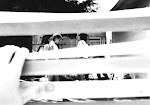I’m always fascinated by the narrow line between discovering a great writer and passing him/her up with an “ehh, maybe not,” and a shrug of the shoulders.
When I was a teenager reading my way through the shelves of the Lexington library I used to run across the novels of Richard Brautigan regularly. They all had weird titles and when I looked at the inside flap there was always a complete failure by the publisher’s copy to describe or convey what in any way they novel was about. Since I liked to know what a book was about before I read it (call me spoiled), I left Richard Brautigan alone. And so his name vanished in my mind behind hundreds of other writers I did or didn’t read, and would have stayed there for good if I was not trying to recall recently what sort of books were peculiar to the 1970s. I looked to see if Brautigan was still a native of my local library (answer – sort of) and then I went to a bookstore and got 3 of his works (Trout Fishing In America, The Pill Vs. the Springhill Mining Disaster and In Watermelon Sugar) in one volume.
Brautigan’s life can be summed up in a very short narrative. Grew up poor in the Pacific Northwest. Bummed around most of his life. Drank. Went through a lot of women. Wrote short, obscure sort-of novels that even a Martian would recognize as being quintessential 1960s. Drank some more. Killed himself. His writings are full of parody and irony. His saving grace may be that, unlike so many of his contemporaries, he wasn’t in love with the sound of his own voice. His sentences are spare and focused and his images are memorable. Fantasy, magical realism and pop culture are balanced by trout fishing, camping in the hills and memories of a hardscrabble childhood. In fact, the Brautigan I’ve found in these works probably not so much a quintessentially 60s writer as a quintessentially Western writer – one far less stuck-up than Wallace Stegner. He creates a modern mythology for his land – Lewis and Clark coexisting in time with a boy watching a Deanna Durbin movie in Great Falls, Montana; a man going to a junkyard and buying a used trout stream; a backwoods outhouse mourning the man who built it.
Sometimes a writer’s reputation won’t rise until several decades after his death. I’m not sure that this will happen to Brautigan – the 60s seem increasingly to be cast as an embarrassing decade, not to be taken seriously – but if his ever does it will be because he is understood as a great modern Western writer, and not merely as someone whose work has to be explained in the context of his times.
Tuesday, December 29, 2009
Subscribe to:
Post Comments (Atom)








4 comments:
Nicely done, Laura. I haven't read Brautigan but you made him and his style real to me.
You have raised my interest in Brautigan, and I also love Deanna Durbin movies - thanks. DEANNA DURBIN DEVOTEES.
First of all, thanks for the follow.
Also, I didn't know it was cool to be a Christian now. When did that happen? I'm a Christian, too, I prefer the tag follower of Jesus, but have yet to sense that people thought I was cool because of it. That would be awesome.
I haven't heard of Brautigan, I actually didn't do a lot of reading growing up, I'm catching up now, though.
My current wip, actually completed is YA chick lit, but I've decided to go back to an old wip, a YA historical about a boy growing up in Hitler Youth.
I'm not a very good speller.
There, we know each other a little. :)
Elle -- both your works sound interesting. That's a fascinating time period. I really put that Christian remark in as a response to people who are kind of aggressively evangelical. I definitely wanted to put up something about my faith and that seemed, well, a non-agressive way to do it.
Texas - You know I went to film school and I love classic movies and yet I've never seen anything by Deanna Durbin. Definitely on my wish list.
Tricia - Thanks. I always like to spread the word when I really like a writer.
Post a Comment